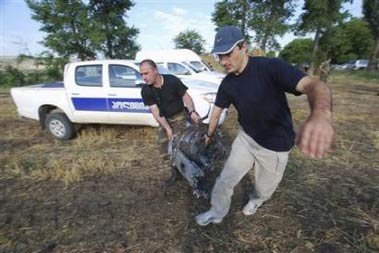Georgia accuses Russia of firing missile at village
(Agencies)Updated: 2007-08-08 09:43
Tsitelubani - Georgia accused Russia on Tuesday of violating its airspace and firing a missile at a village deep in its territory, but Moscow denied carrying out an attack that renewed long-running tensions with Tbilisi.
Georgian President Mikhail Saakashvili said the missile, which did not explode, was part of a pattern of Russian aggression against its neighbors across Europe and urged European states to condemn Moscow.
"This is not Georgia's problem. This is a problem for European security and safety," Saakashvili said in English after traveling to the village of where the missile landed.
In Tbilisi, Russia's ambassador was summoned to the foreign ministry and handed a note of protest over the missile, which officials said was fired by a Russian Sukhoi jet that entered Georgian airspace from Russia.
The missile, fired at about 1930 local time (1530 GMT) on Monday, burrowed into a field of corn and potatoes near the village of Tsitelubani. An interior ministry official said it would have caused a "disaster" if it had detonated.
Russian officials said their aircraft were nowhere nearby, and suggested Georgian jets may have fired the missile on their own territory as a way of provoking tensions in the region.
At the scene, about 65 km (40 miles) west of Tbilisi, Saakashvili said Georgia's reaction would be one of "remarkable calm ... which is what they are not expecting."
He drew a parallel with cyber-attacks on Russia's neighbor Estonia this year, which some there blamed on the Kremlin, and said European states should not appease Moscow.
"I don't really see how often it can happen and how further these intrusions might go before the international community has a really strong reaction," he told Reuters.
"We all should stop them before it's too late. I think this time we'll get much more outcry and much more reaction."
The incident reignited tensions between Tbilisi and Moscow that have lurched from one crisis to another since Georgia elected the pro-Western Saakashvili in 2004. He has assertively pulled his small ex-Soviet country out of Russia's orbit.
Some analysts speculate a row with Georgia could play into the hands of cliques inside the Kremlin jostling for position ahead of the 2008 presidential election, when President Vladimir Putin is to step down.
"Ratcheting Tension"
Moscow denied a Russian jet fired the missile and called for an investigation to find out who was responsible.
Russia's foreign ministry pointed the finger back at Tbilisi, making a link with a missile attack in March on Georgia's Kodori gorge. Tbilisi blamed that attack on Moscow, but Russia said it was carried out by Georgia.
"The fact that the Georgian armed forces have (Sukhoi jets) in operation ... allows us to suppose that certain forces, acting according to type, are continuing to ratchet up the tensions around the conflicts in Georgia," the ministry said.
Georgian officials initially said two Russian aircraft had violated their airspace, but later said there was a single jet.
In Tsitelubani the missile was embedded in a crater around 5 meters (16 ft) deep. A Reuters correspondent there saw fragments of missile fins and other debris, some with Cyrillic writing on them, that had been gathered into piles near the crater.
"I was sitting in my garden resting a bandaged leg when I saw a plane in the sky," local resident Ilia Psuturi said. "I then saw smoke rising from the ground up to the sky and only then did I hear the explosion. The plane then turned around."
The missile was taken to a nearby military base and detonated under controlled conditions, Georgian military officials said.
The Organization for Security and Cooperation in Europe (OSCE), the continent's biggest security and human rights group, appealed to Georgia and Russia for restraint.
"We are looking at information about the circumstances very carefully and due to its importance, we request the most accurate and urgent report on the facts," chairman-in-office, Spanish Foreign Minister Miguel Angel Moratinos, said.
"Meanwhile, I appeal to all parties to address this serious issue with restraint."
Relations between Russia and Georgia deteriorated sharply last year when Tbilisi deported four Russian army officers, accusing them of spying.
Moscow responded by recalling its ambassador and cutting air, sea and postal
links with Georgia. Russia also deported several thousand Georgians, saying they
were illegal immigrants.
|
|
|
||
|
||
|
|

